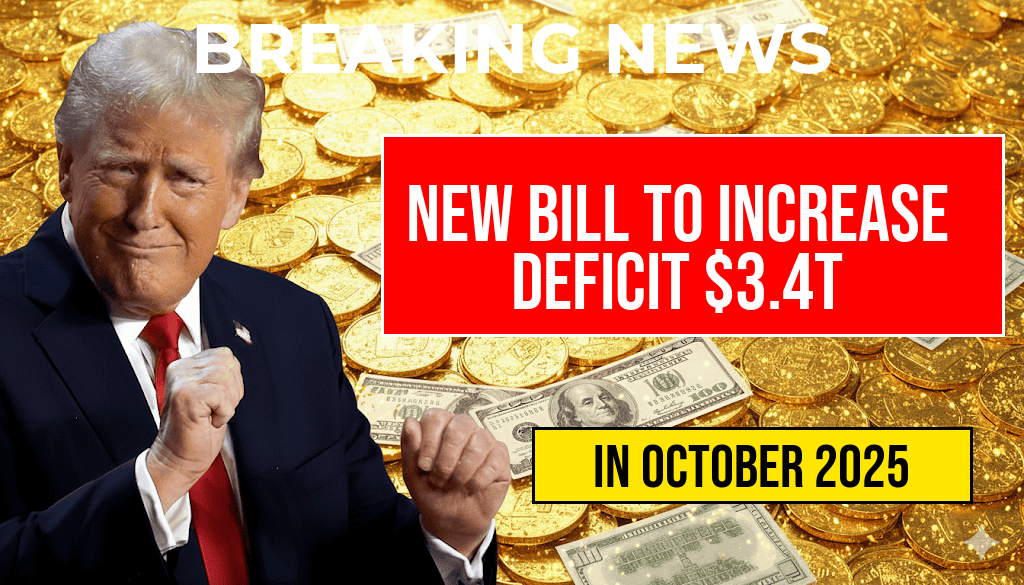Taxpayers are bracing for significant fiscal changes as the newly proposed legislation, informally dubbed the “One Big Beautiful Bill,” aims to address various social and economic concerns. However, a recent analysis from the Congressional Budget Office (CBO) projects that this bill will increase the national deficit by a staggering $3.4 trillion over the next decade. The implications of such a substantial deficit increase are drawing widespread attention from both political leaders and economic analysts, raising questions about the long-term impact on the U.S. economy.
Understanding the Proposed Legislation
The “One Big Beautiful Bill” is a comprehensive legislative package that encompasses a range of initiatives, including expanded social programs, infrastructure investment, and tax reforms aimed at wealth redistribution. Supporters argue that these measures are essential for stimulating economic growth and addressing systemic inequalities. However, critics are concerned about the fiscal sustainability of such ambitious spending plans.
Key Components of the Bill
- Infrastructure Investment: Allocating funds for roads, bridges, and public transportation to enhance national connectivity.
- Healthcare Expansion: Increasing access to affordable healthcare services for low-income families.
- Education Funding: Providing financial support for public schools and colleges to improve educational outcomes.
- Tax Reform: Adjusting tax brackets and closing loopholes to ensure wealthier individuals contribute a fairer share.
Financial Implications of the Bill
The CBO’s report highlights that while the proposed bill’s initiatives may stimulate short-term economic activity, the projected $3.4 trillion increase in the deficit raises concerns about the country’s long-term fiscal health. The growing debt could lead to increased borrowing costs and a potential downgrade of the U.S. credit rating.
Reactions from Political Leaders
Political leaders are divided on the bill’s potential impact. Proponents, primarily from the Democratic Party, assert that the investments outlined in the legislation will yield significant returns by creating jobs and enhancing the quality of life for millions of Americans. They argue that the cost of inaction would be far greater than the projected deficit increase.
On the other hand, Republican leaders and some moderate Democrats are voicing their apprehensions. They emphasize the need for fiscal responsibility and caution against exacerbating an already substantial national debt. Their concerns are echoed by fiscal conservatives, who argue that unchecked spending could lead to long-term economic instability.
Expert Opinions on the Economic Outlook
Economists are weighing in on the potential outcomes of the bill. Some express optimism that targeted investments could lead to increased productivity and economic growth, ultimately offsetting the initial costs. Others, however, warn of the risks associated with high levels of public debt, particularly in an uncertain global economic environment.
Dr. Jane Smith, an economist at the Economic Policy Institute, stated, “While the intentions behind the legislation are commendable, we must tread carefully. The ramifications of increasing our deficit by $3.4 trillion could hinder our economic recovery if not managed properly.”
Public Sentiment and Accountability
Public opinion on the bill is mixed. Many Americans support the idea of improving infrastructure and social services, yet there is also a palpable concern regarding the financial implications of such a large deficit increase. Transparency and accountability will be crucial as the legislation moves through Congress.
Taxpayer advocacy groups are urging lawmakers to consider the long-term effects of the bill on future generations. They argue that any new spending should be balanced with measures to reduce the deficit, ensuring that fiscal responsibility is maintained.
Future Prospects and Legislative Process
The proposed legislation is expected to undergo significant debate in Congress, with amendments likely to be introduced as lawmakers seek to address concerns from both sides of the aisle. As the discussion unfolds, the CBO will continue to assess the financial implications of any modifications, providing updates on the projected impact on the deficit.
Conclusion: A Critical Juncture for Taxpayers
The “One Big Beautiful Bill” presents a pivotal moment for taxpayers, with substantial investments on the table alongside fears of increased national debt. As the legislative process advances, it will be essential for both lawmakers and constituents to engage in informed discussions about the potential benefits and pitfalls of this ambitious initiative. Understanding the balance between immediate needs and long-term fiscal health will be crucial as the nation navigates this complex economic landscape.
For further information on the implications of the proposed bill, visit Forbes or check the CBO Report.
Frequently Asked Questions
What is the ‘One Big Beautiful Bill’?
The ‘One Big Beautiful Bill‘ refers to a proposed legislation aimed at implementing significant financial changes. It is designed to address various taxpayer issues but has raised concerns about its impact on the federal budget.
How much is the deficit expected to increase due to this bill?
The implementation of the ‘One Big Beautiful Bill‘ is projected to increase the federal deficit by approximately $3.4 trillion, raising concerns among economists and taxpayers alike.
What are the main components of the proposed legislation?
The bill includes several provisions aimed at reforming taxation, increasing spending on social programs, and providing economic stimulus, though specific details are still being debated.
Who will be most affected by the increased deficit?
The increased deficit could have widespread implications, potentially affecting taxpayers, government services, and future economic growth. Interest rates and inflation may also be impacted.
What should taxpayers do in response to this bill?
Taxpayers are advised to stay informed about the developments surrounding the ‘One Big Beautiful Bill‘ and consider voicing their opinions to their representatives to express concerns about its fiscal implications.

Leave a Reply